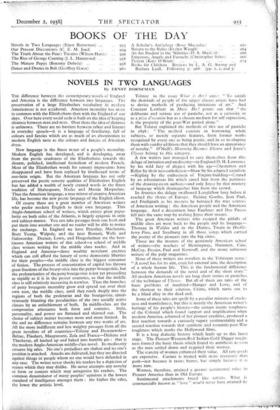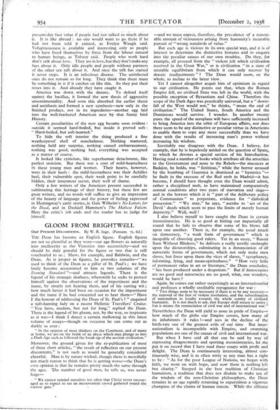NOVELS IN TWO LANGUAGES
BOOKS OF THE DAY
By ERNST BORNEMAN
THE difference between the contemporary novels of England and America is the difference between two languages. The preservation of a large Elizabethan vocabulary in modern Americanese is not accidental. American mentality has more in common with the Elizabethans than with the England of our days. Over here every social code is built on the idea of keeping distance between man and man. Over there the idea of distance is unknown. There are no barriers between talker and listener in everyday speech—it is a language of familiarity, full of colours and fancies which are as much of an abomination to modern English taste as the colours and fancies of American dress.
Now language is the finest meter of a people's mentality. Modern English has developed, and is developing, away from the poetic crudeness of the Elizabethans towards the distant, polished, intellectual formalism of modern French. Most of the Elizabethan words for sensory impressions have disappeared and have been replaced by intellectual terms of neo-latin origin. But the American language has not only preserved the poetic sensory qualities of Elizabethan English but has added a wealth of newly created words in the finest tradition of Shakespeare, Nashe and Martin Marprelate. Thus the American language, a true mirror of creative American life, has become the new poetic language of the English idiom.
Of course there are a great number of American writers who prefer modern English to their own language. This Anglo-American school of writers, which enjoys great popu- larity on both sides of the Atlantic, is largely epigonic in style and subject-matter. You can take passages from one book and put them into another one and no reader will be able to notice the exchange. In England we have Priestley, Mackenzie, Brett Young, Walpole, and the later Bennett, Wells and Galsworthy. Dreiser, Lewis, and Hergesheimer are the best- known American writers of this school—a school of middle class writers writing for the middle class reader. And in England and America—those wealthy merchant empires which can still afford the luxury of some democratic liberties for their peoples—the middle class is the biggest consumer of fiction. The process of concentration of capital has thrown great fractions of the bourgeoisie into the pettyr bourgeoisie, but the proletarisation of the petty bourgeoisie is not yet proceeding as rapidly as it is in the poorer countries, so that the middle class is still relatively increasing in number. Thus the branches of petty bourgeois mentality grow and spread out over their own root, the middle class, until they reach deeply into the regions of both the proletariat and the bourgeoisie, simul- taneously blunting the peculiarities of the two socially active classes by an enfeeblement of both. In middle-class art the compromise attenuates both form and contents. Style, personality, and power are flattened and thinned out. The choice of subject matter becomes more and more limited. In the end no difference remains between any two works of art. All the more indifferent and less weighty passages from all the great novelists of all countries—Tolstoy and Dostoiewski- Balzac, Flaubert, Maupassant, Zola and France—Dickens and Thackeray, all hashed up and baked into humble pie : that is the modern Anglo-American middle-class novel. Its mediocrity ensures big sales. No one's prejudices are shaken and no one's position is attacked. Attacks are delivered, but they are directed against things or people whom no one would have defended in any case. The writer never shocks his readers by a depiction of scenes which they may dislike. He never attempts any novelty of form or content which may antagonise his readers. The common denominator of many peoples' opinions is the lowest standard of intelligence amongst them : the higher the sales, the lower the artistic level. Tolstoy in the essay What is Art ? says : " To satisfy the demands of people of the upper classes artists have had to devise methods of producing imitations of art." And Constant Lambert in Music Ho ! points out that " the deliberate and serious use of pastiche, not as a curiosity or as a pike d'occasion but as a chosen medium for self expression, is the property of the post-War period alone."
But Tolstoy explained the methods of this use of pastiche in 1898: " The method consists in borrowing whole subjects, or merely separate features, from former works recognised by every one as being poetic, and in so re-shaping them with sundry additions that they should have an appearance of novelty." O'Neill's Mourning Becomes Electra and Joyce's Ulysses belong to this category.
A few writers just managed to save themselves from this deluge of imitation and mediocrity—in England.D. H. Lawrence by his wild fury of disgust with his age—Chesterton and Belloc by their neo-catholicism—Shaw by his adapted socialism —Kipling by the enthusiasm of Empire-building—Conrad by an adventurous life which saved him from the pettiness of the drawing-room authors—and only Joyce by that mastery of language which distinguishes him from the crowd.
In America the deluge swallowed Longfellow long before it reached the shores of Europe. Picking Goethe, Jean Paul, and Freiligrath as his masters he betrayed the true sources of American writing : the American people and the American language. And a decennium later Faulkner and Dos Passos fell into the same trap by making Joyce their master.
The great American writers who escaped the pitfalls of middle class art went back to the people and its language— Thoreau in Walden and in the Diaries, Twain in Huckle- berry Finn, and Sandburg in all those songs which carried the poetry of the pioneers into the big cities.
Those are the masters of the genuinely American school of writers—the teachers of Hemingway, Hammett, Cain, McCoy, Fessier, Paul and Komroff, and the many unknown writers of the pulp magazines.
None of these writers are novelists in the Tolstoyan sense : " A novel has for its aim, even for external aim, the description of a whole human life. This is the fundamental difference between the demands of the novel and of the short story." All modern American novels are long short stories or pastiches of the technique of Ulysses. But all of them are tales of the basic problems of mankind—Hunger and Love, and of the shortcut to their solution, Crime, which turns out to be a blind alley in the dead end.
Some of these tales are spoilt by a peculiar mixture of crude- ness and mawkishness, but this is merely the American writer's heritage of his people's history—the certain innate toughness of the Colonial which found support and amplification when modern America, ashamed of her pioneer crudities, produced a first reaction towards a curiously sugary sentimentality and a second reaction towards that synthetic and romantic post-War toughness which marks the Hollywood films.
It is a long dialectic history which leads up to this latest stage. The Pioneer-Western-Red Indian-Gold Digger tough- ness formed the basic thesis which found its antithesis as soon as the men settled down and required their women.
The scarcity of women enhanced their value. All rare goods are expensive. Caviare is treated with more reverence than pork—not because it tastes better, but simply becat'se it is more rare.
Women, therefore, attained a greater sentimental value in Pioneer America than in Old Europe. Sentimental attachments breed like rabbits. What is commercially known as " love " would never have attained its present-day face value if people had not talked so much about it. It is like abroad : no one would want to go there if he had not been told it existed, as Evelyn Waugh said. Voluptuousness is .available and interesting only to people who have freed themselves by force from the labour natural to human beings, as Tolstoy said. People who work hard don't talk about love. They are in love, but they don't make any fuss about it. Only idle people and people without partners of the other sex talk about it. And once the talk has started it never stops. It is an infectious disease. The uninfected ones do not remain so for long. They think that there must be something in it if it catches on like this. So they put their noses into it. And already they have caught it.
America was down with the disease. To defend itself against the bacillus, it formed the new thesis of aggressive unsentimentality. And soon this absorbed the earlier thesis and antithesis and formed a new synthesis—new only in the finished product, not in its ingredients—another egg laid into the well-feathered American nest by that funny bird History.
Certain peculiarities of the new egg became soon evident : Outside it seemed hard-boiled, but inside it proved soft : -" Hard-boiled, but soft-hearted."
To hide the soft interior the thing produced a fine weatherproof shell of nonchalance. Nothing mattered, nothing held any surprise, nothing caused embarrassment, nothing was good, nothing bad, everything was accepted as a matter of course.
It looked like cynicism, like superhuman detachment, like perfect stoicism. But there was a core of mild-heartedness in these young men and women. Their hearts, however, were in their heels : the mild-heartedness was their Achilles heel, their vulnerable spot, their weak point to be carefully hidden, their innermost secret, their well of shame.
Only a few writers of the American present succeeded in sublimating this heritage of their history, but these few are great writers, and no words will suffice to give an impression of the beauty of language and the power of feeling expressed in Hemingway's early stories, in Gale Wilhelm's No Letters for the Dead, and in Dashiell Hammett's The Maltese Falcon. Here the critic's job ends and the reader has to judge for himself.



























































 Previous page
Previous page